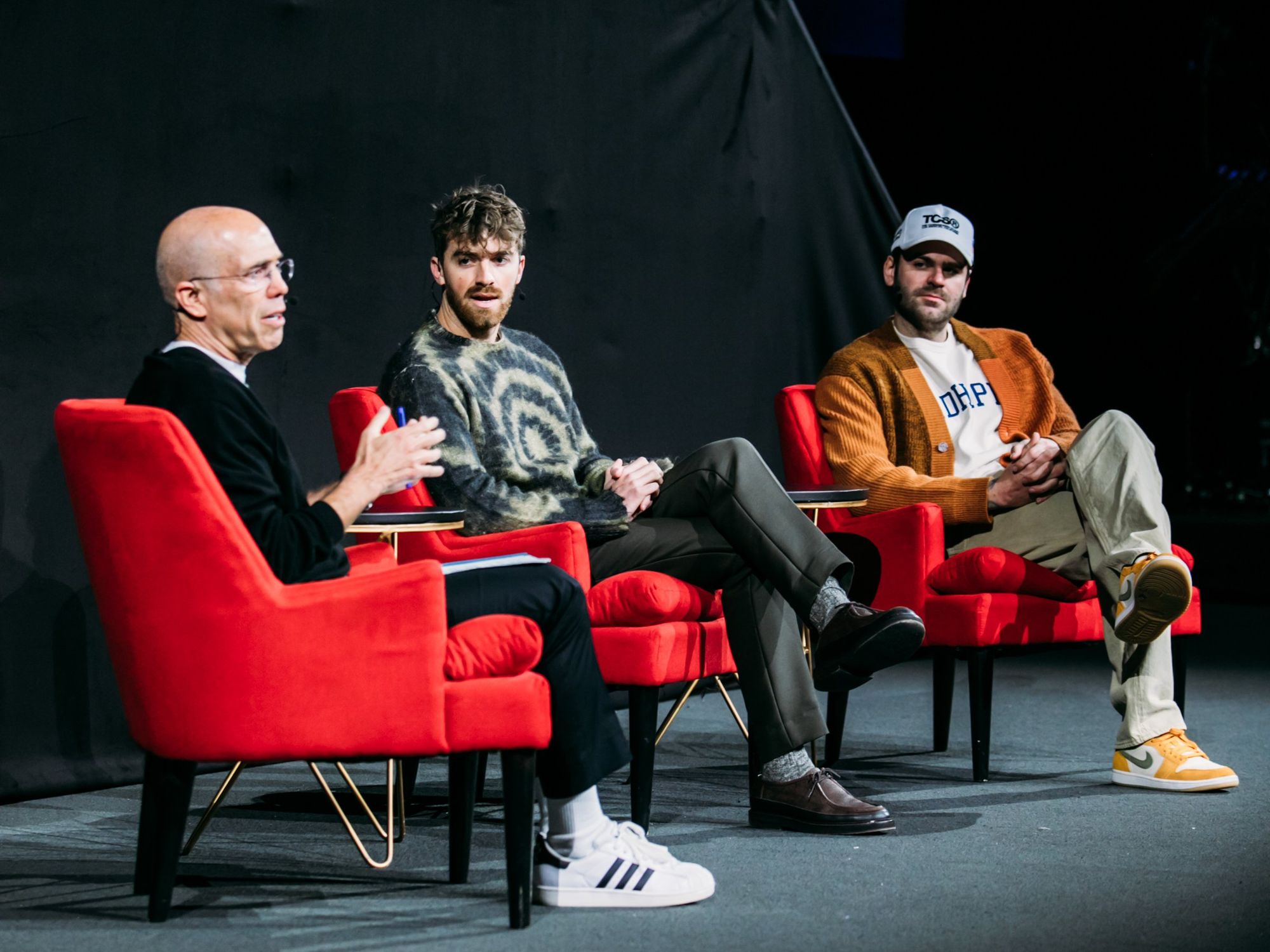Upfront Ventures Summit: The Chainsmokers Journey From Music to Venture
Decerry Donato is a reporter at dot.LA. Prior to that, she was an editorial fellow at the company. Decerry received her bachelor's degree in literary journalism from the University of California, Irvine. She continues to write stories to inform the community about issues or events that take place in the L.A. area. On the weekends, she can be found hiking in the Angeles National forest or sifting through racks at your local thrift store.

On Thursday, Upfront Ventures hosted its 2023 Summit and music icons Alex Pall and Drew Taggart of The Chainsmokers hit the stage, not to perform, but instead to discuss their venture journey.
The duo launched MantisVC, a Marina Del Rey-based early stage tech venture fund in 2019.
Pall and Taggart shared the stage with WndrCo’s managing partner Jeffrey Katzenberg to dive deeper into what their music career has taught them and how it translated over to their venture firm.
Here are some of the most important takeaways:
The duo believes hustle is more important than talent to achieve success.
“There's just so much content out there that's just happening all the time for no reason,” Taggart said. “There's just so much to pay attention to and if you have to wake up every day, and think out what your angle is going to be, try stuff, have it not work. You have to accept defeat so frequently and still get up and do it.”
Creating music was their foray into building communities.
“I think we have some real insight into how to build that community and tell that story because essentially, that's all we're trying to do,” Pall said. “No matter what your business is, you're telling the story about something that you think is important that someone else needs and will enjoy.”
Building connections and having conversations with pioneers in the space helped them launch MantisVC.
“Humility and being self aware are two of our strengths,” Taggart said. “I think knowing what we don't know is a big part of how we've gotten to where we are, and with the support of people around us, and the relationships we built, we understood that we were going to have to go out and prove to the world that we were serious about this and we respected the people that have come before us and the people that are doing it right now.”
VCs should offer all their founders support.
“When you're building something early on, you want that support, that hands-on feeling and the purpose of Mantis isn't necessarily right now to replace the incredible institutional investors that exist out there and have been around for a while,” Pall continued.
“But we want to be the Robin to their Batman, and we think there's a way that we can kind of partner with everybody in the space and provide our founders that holistic support they need. It's inspiring to work alongside people that share that same energy and we're constantly working on ourselves and I feel like it takes a really special type of human being to be successful in this world. Level of grit and determination and something that's continually fueled us and we want to invest in people like that.”
Feedback is necessary and essential to create successful products and businesses.
“Similar to products or services that you're building, it's important to get real life feedback out there and iterate on those things,” Taggart said. “And there's really just no substitute for that.”
Pall added, “I think for some reason in our culture, it's become an issue for people just to be straightforward and say no, about things and give honest feedback and, and move on. I think we can all learn a lot from just having more honest conversations with each other.”
Never lose sight of your core audience and mission as a company.
“Never forget what your core product is and what people love about that and make sure that every piece of innovation is derivative of that,” Taggart said. “I see a lot of friends of ours that have had really successful companies start to build ancillary projects that don't really feed their core audience that they're just making to compete with their competition. We do the same thing in songwriting, and you can never lose sight of what people love about you.”
- Office Hours Podcast: How the Chainsmokers Grew Into Venture Capitalists ›
- Upfront Summit Postponed to March Over Omicron Fears ›
- Here Are the VCs and Angels Currently Cutting Checks in Southern California ›
- Upfront Ventures Raises $650M for Three New Funds ›
- Larry Summers' Advice to Founders: Raise Early, Raise Often - dot.LA ›
Decerry Donato is a reporter at dot.LA. Prior to that, she was an editorial fellow at the company. Decerry received her bachelor's degree in literary journalism from the University of California, Irvine. She continues to write stories to inform the community about issues or events that take place in the L.A. area. On the weekends, she can be found hiking in the Angeles National forest or sifting through racks at your local thrift store.



 Image Source: Revel
Image Source: Revel
